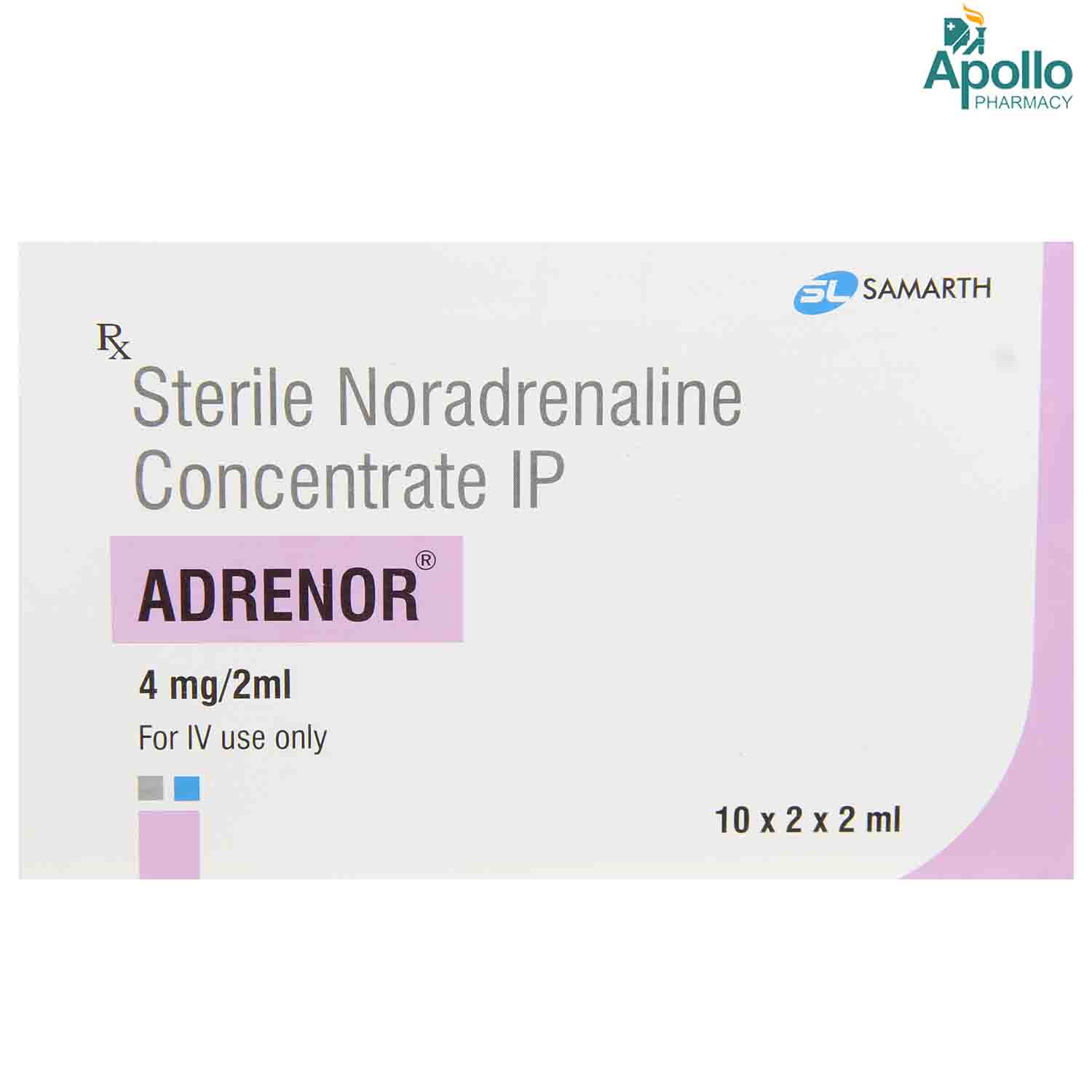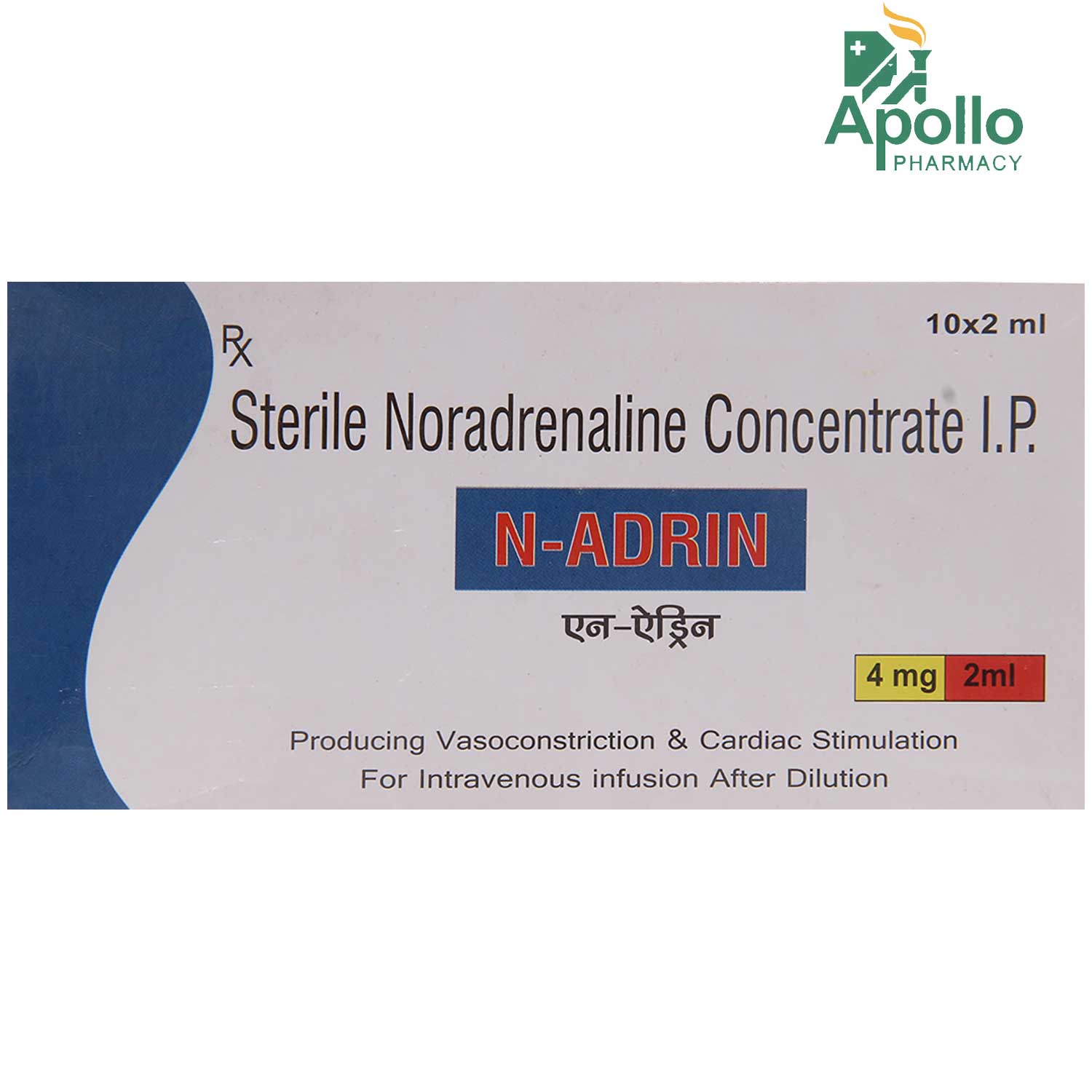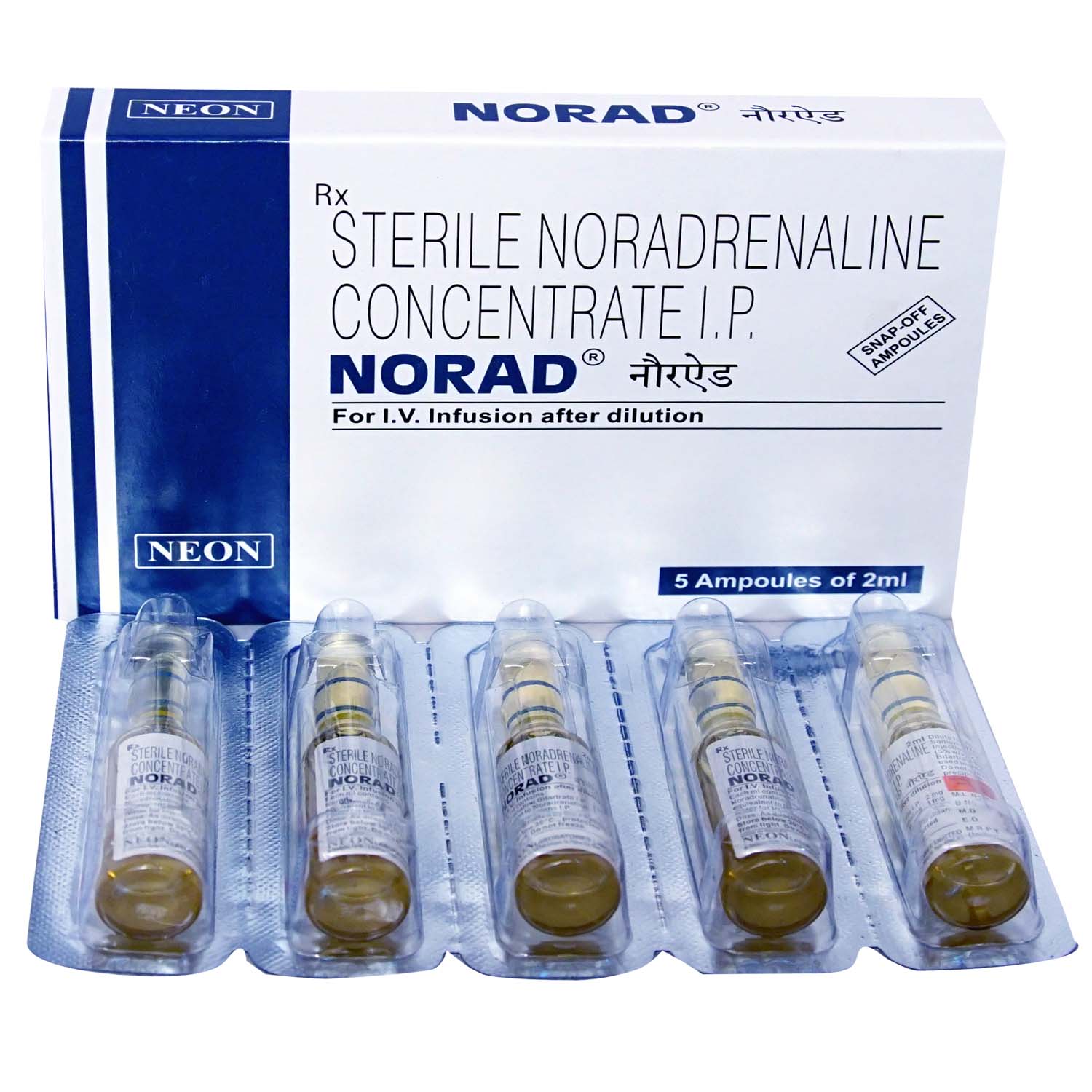Noradrac 4mg Injection

MRP ₹32
(Inclusive of all Taxes)
₹4.8 Cashback (15%)
know your delivery time
Provide Delivery Location
Composition :
Manufacturer/Marketer :
Consume Type :
Return Policy :

Secure Payment

Trusted by 8 Crore Indians

Genuine Products
Therapeutic Class
Author Details
We provide you with authentic, trustworthy and relevant information
FAQs
Noradrac 4mg Injection contains Norepinephrine that works by constricting and narrowing blood vessels by acting on alpha receptors that causes muscle contractions. Thus, it increases heart rate and blood pressure.
You are not recommended to take duloxetine (antidepressant) with Noradrac 4mg Injection as co-administration of these two medicines may increase the risk of high blood pressure and heart rate. However, please consult your doctor before taking other medicines with Noradrac 4mg Injection.
Noradrac 4mg Injection should be used with caution in patients suffering from heart rhythm disorders as it may increase the risk of severe adverse effects. Therefore, inform your doctor if you have any heart problems before taking Noradrac 4mg Injection so that the dose may be adjusted appropriately or an alternate medicine may be prescribed.
You are recommended to take Noradrac 4mg Injection with caution if you have diabetes as it may increase blood sugar levels. Therefore, it is advised to inform your doctor if you have diabetes before taking Noradrac 4mg Injection.
Noradrac 4mg Injection may cause a headache as a temporary side effect. However, if the condition persists or worsens, please consult a doctor.
Disclaimer
Alcohol
Safe if prescribed
Interaction of Noradrac 4mg Injection with alcohol is unknown. Please consult a doctor before consuming alcohol while using Noradrac 4mg Injection.
Pregnancy
Consult your doctor
Noradrac 4mg Injection is a category C pregnancy drug and is given to pregnant women only if the doctor thinks benefits outweigh risks. Please consult a doctor if you are pregnant.
Breast Feeding
Consult your doctor
Noradrac 4mg Injection is given to breastfeeding women only if the doctor thinks benefits are greater than risks. Please consult a doctor if you are breastfeeding.
Driving
Safe if prescribed
Drive only if you are alert after taking Noradrac 4mg Injection. However, Noradrac 4mg Injection is generally given for hospitalised patients.
Liver
Consult your doctor
Noradrac 4mg Injection should be given with caution, especially if you have a history of Liver diseases/conditions. The dose may be adjusted by your doctor as required.
Kidney
Consult your doctor
Noradrac 4mg Injection should be given with caution, especially if you have a history of Kidney diseases/conditions. The dose may be adjusted by your doctor as required.
Children
Safe if prescribed
Noradrac 4mg Injection is not recommended for children as the safety and effectiveness were not established.
Product Substitutes
About Noradrac 4mg Injection
Noradrac 4mg Injection belongs to a class of medications called antihypotensives primarily used to treat hypotensive (low blood pressure) emergencies. Hypotension is a condition in which the blood flows through the blood vessels at lower than normal pressures. Low blood pressure symptoms include tiredness, dizziness, light-headedness, loss of consciousness, nausea, depression, blurry vision, or clammy (wet or sweaty) skin.
Noradrac 4mg Injection contains Norepinephrine that works by constricting and narrowing blood vessels by acting on alpha receptors that cause muscle contractions. Thus, it increases heart rate and blood pressure.
You are advised to take Noradrac 4mg Injection for as long as your doctor has prescribed it for you based on your medical condition. In some cases, you may experience headaches, anxiety, tremor, difficulty in breathing, vomiting, high blood pressure, or urinary retention. Most of these side effects of Noradrac 4mg Injection do not require medical attention and gradually resolve over time. However, if the side effects persist, please consult your doctor.
If you are allergic to Noradrac 4mg Injection or any other medicines, please tell your doctor. Please consult a doctor if you are pregnant or breastfeeding before taking Noradrac 4mg Injection. Noradrac 4mg Injection is not recommended for children. If you have irregular heartbeats, hyperthyroidism (overactive thyroid gland), diabetes, angina pectoris (chest pain), vascular blockage in limbs or stomach, any heart problems, or if you recently had a heart attack, inform your doctor before taking Noradrac 4mg Injection. If it is essential to administer Noradrac 4mg Injection simultaneously as plasma or blood transfusion, plasma or blood may be administered in a separate drip.
Uses of Noradrac 4mg Injection
Medicinal Benefits Mweb
Key Benefits
Noradrac 4mg Injection contains Norepinephrine used in the treatment of hypotensive (low blood pressure) emergencies. Noradrac 4mg Injection constricts and narrows blood vessels by acting on alpha receptors that cause muscle contractions. Thus, Noradrac 4mg Injection redirects blood to heart and brain by narrowing blood vessels in the extremities, which increases heart rate and blood pressure. Noradrac 4mg Injection is used to restore blood pressure to normal in emergencies that require an immediate rise in blood pressure to a normal level.
Directions for Use
Side Effects of Noradrac 4mg Injection
- Headache
- Anxiety
- Tremor
- Difficulty in breathing
- Vomiting
- High blood pressure
- Urinary retention
Drug Warnings
If you are allergic to Noradrac 4mg Injection or any other medicines, please tell your doctor. Please consult a doctor if you are pregnant or breastfeeding before taking Noradrac 4mg Injection. Noradrac 4mg Injection is not recommended for children. If you have irregular heartbeats, hyperthyroidism (overactive thyroid gland), diabetes, angina pectoris (chest pain) or any vascular blockage in limbs or stomach, any heart problems, or if you recently had a heart attack, inform your doctor before taking Noradrac 4mg Injection. If it is essential to administer Noradrac 4mg Injection at the same time as plasma or blood transfusion, plasma or blood may be administered in a separate drip. Noradrac 4mg Injection is not recommended for patients suffering from low blood pressure caused by hypovolaemia (low blood volume).
Drug-Drug Interactions Checker List
- IMIPRAMINE
- DULOXETINE
- VENLAFAXINE
- PHENELZINE
- MOCLOBEMIDE
- LINEZOLID
- METHYLENE BLUE
Habit Forming
Special Advise
Regular monitoring of heart rate and blood pressure are recommended while taking Noradrac 4mg Injection.
Diet & Lifestyle Advise
- Eat small meals more frequently.
- Drink plenty of fluids to stay hydrated as dehydration may reduce blood volume resulting in low blood pressure.
- Include vitamin B12-rich foods such as animal meats, eggs, fortified cereals, and nutritional yeast.
- Eat foods rich in folates such as beans, asparagus, lentils, leafy greens, citrus fruits, liver, and eggs.
- Try to eat smoked fish, canned soup, pickled items, cottage cheese, and olives as salty foods can also increase blood pressure.
- Take frequent breaks if you exercise outdoors in extreme heat.
- Avoid spending a long time in hot tubs, steam rooms, and saunas to prevent dehydration.
All Substitutes & Brand Comparisons
RX
Adrenor Injection 2 ml
Samarth Life Sciences Pvt Ltd
₹42
(₹18.5/ 1ml)
28% COSTLIERRX
N-Adrin 4 mg Injection 2 ml
AAA Pharma Trade Pvt Ltd
₹42
(₹18.9/ 1ml)
31% COSTLIERRX
Out of StockNorachem 4mg Injection
₹76
(₹34.2/ 1ml)
137% COSTLIER

Have a query?






